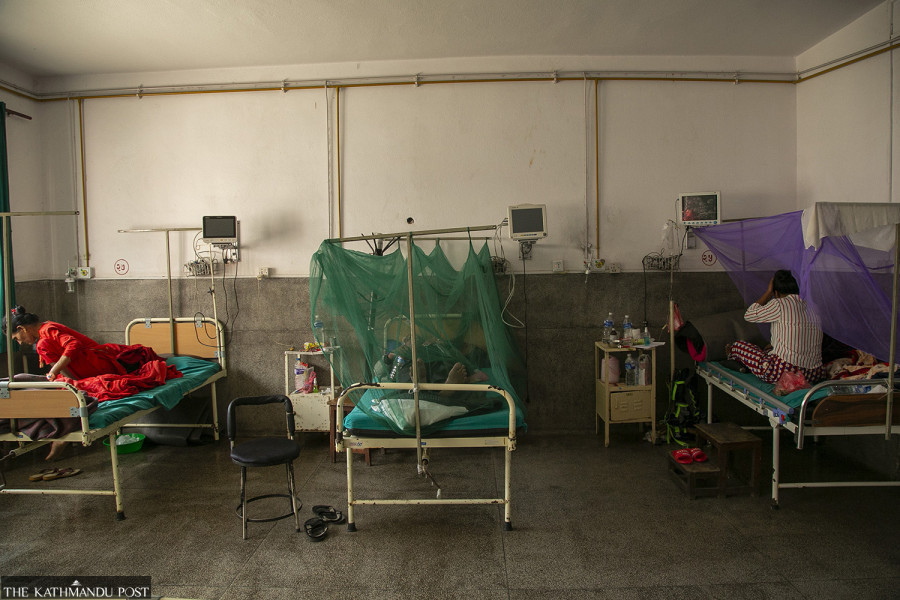Editorial
Dengue rising
There are no year-round surveillance and prevention programmes to tackle this growing health menace.
After a months-long heatwave, the recent rainfall in Nepal brought much-needed relief and helped put out wildfires. Unfortunately, the rainwater, coupled with warmth, also created a favourable environment for dengue-carrying mosquitoes. As a result, dengue cases are already on the rise, with 57 districts reporting dengue infection, and over 50 cases were reported in a single week. Experts believe the worst is yet to come.
Even though dengue has taken many lives in the past few years (20 deaths in 2023, 88 in 2022 and six in 2019) and infected many (52,000 in 2023, 54,000 in 2022 and 16,000 in 2019), it remains the most neglected virus. Authorities seem to care little either about its spread or severity. Nor do they try to understand the changing nature of the virus from climate change and rising temperatures through research and tests. A Dengue Action Plan is in place, but the government hasn’t been able to do enough to contain the spread of the virus except relying on traditional methods like surveillance of the virus, serotyping of the dengue-carrying mosquitoes, plus treatment, management and collaboration with local levels. Even the action plan acknowledges that the country’s dengue spread has gone out of hand, making it difficult to contain.
Nepal is unable to undertake year-round surveillance and prevention programmes due to budgetary limits. The action plan clearly states that there’s no budget to deal with dengue throughout the year. This was bound to happen as the health ministry’s budget was reduced this fiscal year, discontinuing many programmes. Moreover, even the budget allocated for a particular fiscal year (for example in 2022-23) is used up before March/April, when cases usually surge. These months, as experts suggest, are crucial, as stopping the spread of the virus just when the cases are rising is the most effective way to cut down on the number of deaths and infections throughout the year. Apart from insufficient budget, the country also lacks entomologists, and no other ministry is held responsible for the work except health.
The situation will only worsen the longer these challenges are overlooked. And removing the dengue menace should not be the sole responsibility of the health ministry. The finance ministry should allocate enough budget to drive dengue prevention measures for a whole year; the environment ministry can implement environmental policies to control the breeding sites of mosquitoes, and urge people to maintain sanitation and proper waste management; the urban development ministry must manage drainage systems and green spaces; while the transportation ministry needs to prevent the accumulation of stagnant water on roads. Only such a collective measure will help reduce dengue dangers.
While continuing with awareness programmes, door-to-door campaigns and search-find-destroy drives should also be pushed on a regular basis. There is a strong case for learning from other countries. For instance, eDengue systems implemented in Malaysia could be used to report cases from rural parts of Nepal and detect severe cases for timely medical intervention. The onus is also on the public to take preventive measures on a year-round basis. Again, dengue is not something that only the government can control. If we don’t work together, many of us will needlessly suffer.




 25.96°C Kathmandu
25.96°C Kathmandu














